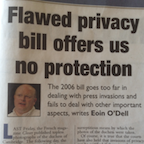A practical and proportionate remedy?
from the original Broadway cast recording of A Little Night Music
via YouTube
Last week, the Minister for Education and Skills, Ruairí Quinn, announced his intention to “introduce new legislation which will oblige universities to comply with government pay policy”:
Some €7.5 million in unapproved and unauthorised payments paid out by universities from 2005-2009
The Minister for Education and Skills has secured government agreement for the drafting of an amendment to the Universities Act 1997. This amendment will give the Minister the power to require universities to comply with government guidelines on remuneration, allowances, pensions and staffing numbers in the University sector. It will further address issues which have arisen in relation to the non-adherence to elements of the Croke Park Agreement. …
The heads of the relevant Bill are here (pdf), and they are discussed as follows on Steve Hedley‘s Ninth Level Ireland blog:
…Universities behaving badly? Send in the clowns!
… The focus is on compliance with a “policy decision made by the Government or the Minister in so far it relates to the remuneration or numbers of public servants employed in that university, or a collective agreement entered into by the Government or the Minister”.





